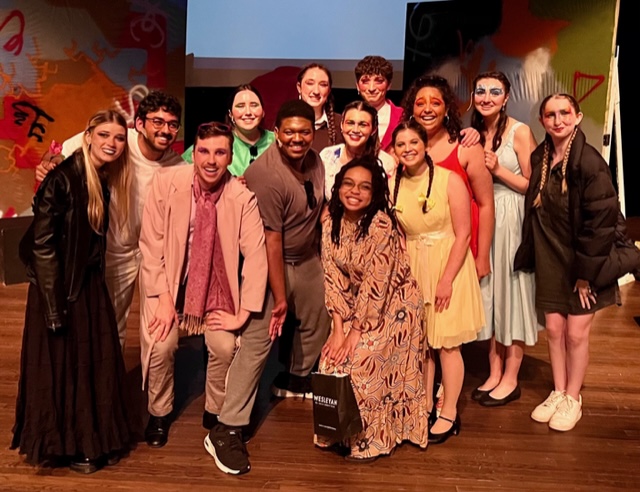
c/o Jason Tey
It was a rainy Saturday afternoon and I was going to see a musical about sentient colored pencils. I wasn’t sure what to expect when I stepped into the ’92 Theater to see “Aubrey’s Pencil Box,” written by Langston Lynch ’20 M.A. ’23 and directed by Samantha Greenwald ’23. However, I was soon won over by the musical’s originality, its meditations on the power of community, and its exploration of the lengths we go to to protect the ones we love.
Performed in the ’92 Theater on April 28 at 8:00 p.m. and on April 29 at 1:00 and 6:00 p.m, the musical focuses on a group of colored pencils that have been neglected by their owner, Aubrey. The show’s protagonist is Sky (Sage Saling ’26), a light blue pencil reduced to a stub after being used in multiple drawings. Death is not a stage normally associated with a colored pencil. While such an event could easily translate as comedic onstage, Lynch’s script moves in the opposite direction, grounding the audience in the terror Sky feels as she confronts her impending doom.

c/o Denae Nelson
Saling was captivating as Sky. Upon her entrance, I was drawn to Saling’s clear, commanding singing voice and emotional intensity, palpably rendering her character’s anxiety. In addition to the strength of Saling’s performance, illustrations by artist Denae Nelson enriched Sky’s reflection on her coming death. Towards the beginning of the show, Sky describes the first drawing Aubrey used her in, a scene which features a butterfly against a background of trees and mountains. As Sky tells this story, excitedly recalling her inclusion in this vivid natural scene, a video of Nelson sketching played on a screen behind her, providing the illusion that this act of creation was happening in real time. The use of projected illustrations in this scene and throughout the show was compelling as it allowed audiences to access the emotional world of its characters.
As much as “Aubrey’s Pencil Box” is a musical about death and facing uncertainty, it’s also about the pain that comes from being under appreciated. Besides Sky, Aubrey has hardly used the other colored pencils in the box. Feeling neglected and as if they haven’t yet reached their full potential, the other pencils harbor resentment towards Sky. This collective frustration rears its ugly head at a memorial service organized by Noir (Corinne Dicpinigaitis ’26) ) which happens while Sky is still alive. In the middle of the service, Saffron (Skye Figueroa ’26), a bright orange pencil, expresses her anger about Sky’s preferential treatment and fights to be valued in a song called “Child of the Sun.” During the number, I was transfixed by Figueroa’s dynamic voice and how she commanded the stage, demanding the audience’s attention.
“Aubrey’s Pencil Box” is also a love story. Early in the show, Pearl (Jerry Persaud Jr. ’26) professes his love for Sky. To give Sky hope amid this dark period of her life, Pearl tells Sky that there is an afterlife for colored pencils when they have been used up. With this gesture, Pearl shows just how far he’s willing to go to protect Sky, lying to her about a heaven for colored pencils to ease her existential dread. In “Beyond the Ocean and the Sky,” one of the most compelling numbers in the show, Sky and the rest of the cast express their newfound hope and purpose knowing they will live on in heaven. It’s moments like these that “Aubrey’s Pencil Box” shines the brightest, when the cast breaks out into harmony and elegantly carries Lynch’s vibrant score.
After such a compelling Act I finale, I had high hopes going into Act II, and for the most part it did not disappoint. We learn more about Titan (Lincoln Turner ’25), a gray pencil who chastises Pearl for convincing Sky of a fake afterlife. Throughout Act II, Turner displays his versatility as an actor. In the song “Northern Lights,” Titan bears it all on the stage, working through his anger with Pearl while also grieving the loss of the girl he loved. Titan comically tangoes with his old love Rose (Saydie Grossman ’26), later repeating the movements on his own to reveal that the duet was a fantasy. As Titan, Turner expresses both vulnerability and humor with ease, and was a joy to watch.
My one critique of “Aubrey’s Pencil Box” is that the show lost a little momentum in the second half. During Act II, we meet Knea, also played by Grossman, an eraser with intimate knowledge of other pencils having been used by Aubrey in several drawings. When Lavender, acted to flamboyant perfection by Stuart Conrad ’26, brags about appearing as red wine in one of Aubrey’s compositions, Knea tells him she erased the wine glass in a later version of the drawing. After Lavender complains about his exclusion from the drawing, Mocha (Molly Volker ’26) reminds him that art doesn’t last in the song “Dust in the Wind.” While Volker’s strong voice carries the song, the melody was nowhere near as original or exciting as the other songs in the show.
“Aubrey’s Pencil Box” picks up energy as it nears its finale. When Sky learns that Pearl lied to her about an afterlife, she must confront feelings of despair and uncertainty about her coming death once again. Trying to assuage her hopelessness, Knea reminds Sky that though her life will end, the drawings that Aubrey used her in will live on. In the song “Art Don’t Die,” Knea points to examples of famous art, such as “The Creation of Adam” by Michelangelo and “The Starry Night” by Van Gogh, which have been appreciated for centuries. Given how much of “Aubrey’s Pencil Box” focuses on art, this number was a powerful reminder of its enduring impact on our lives.
After the show ended, I felt revitalized. It’s rare to see a piece of theater that’s so out of the box yet so grounded in emotion. While “Aubrey’s Pencil Box” is a musical about anthropomorphic colored pencils, it manages to tell a story that is poignant and deeply human. Offering a lively score and dynamic performances, the show is a rich and energizing theatrical experience. With “Aubrey’s Pencil Box,” Lynch showcases her range as a composer and playwright. Lynch is an exciting new voice in musical theater and I can’t wait to see what she does next.
Ben Togut can be reached at btogut@wesleyan.edu.
Comments are closed